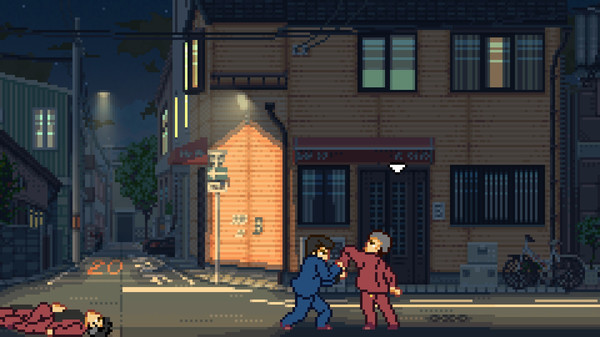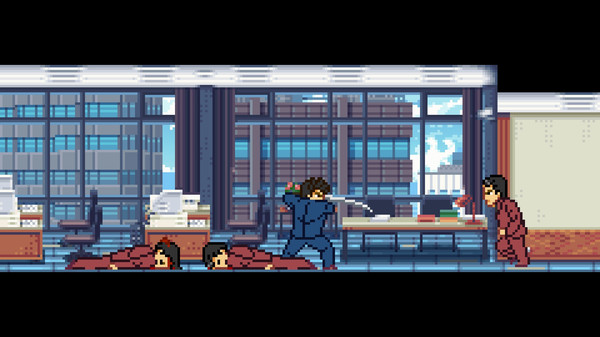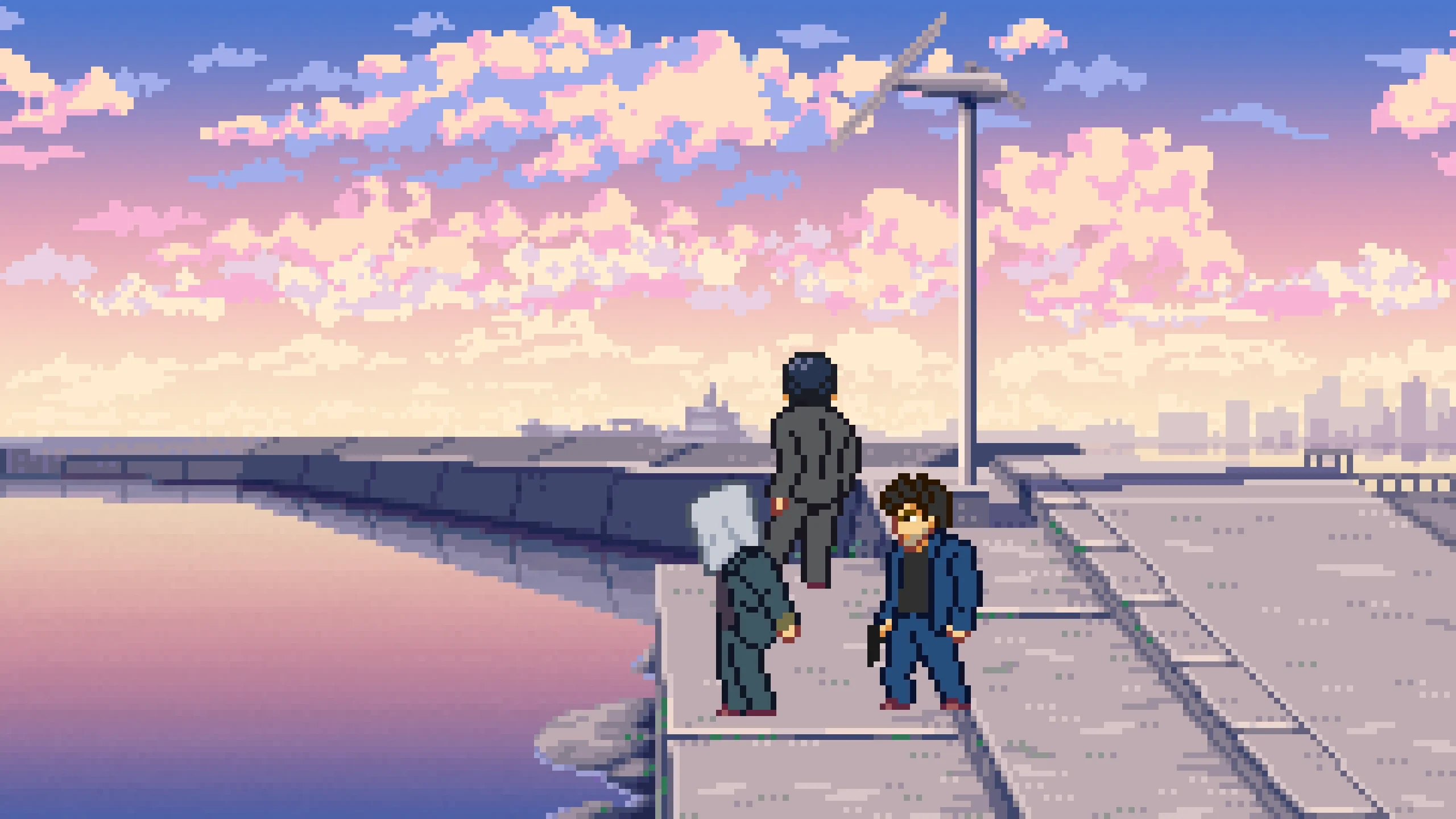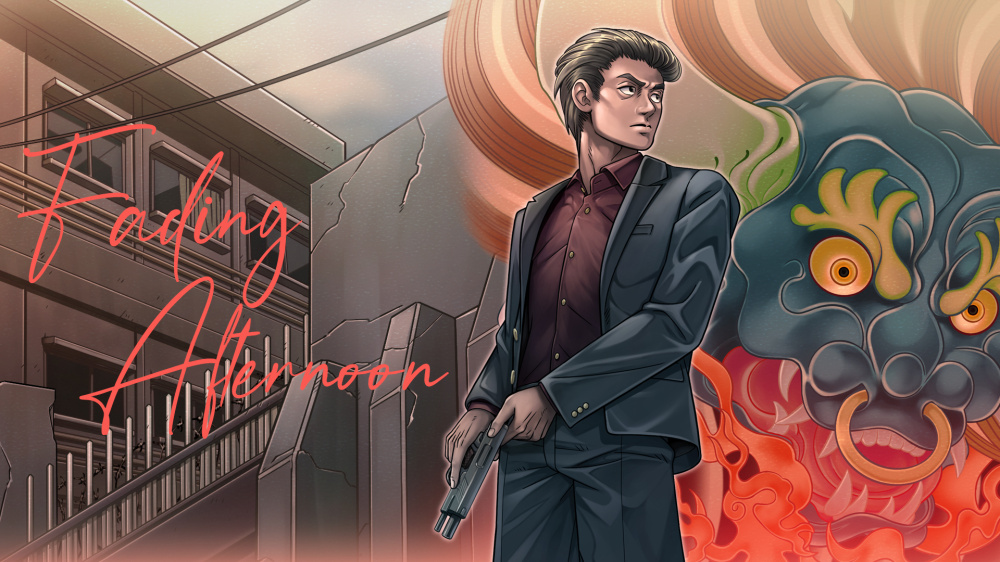Fading Afternoon is the third game developed by Yeo. A small team devised by Yeo himself to create cinematic 2D-pixel art games that lean heavily into the noir/crime genre. If you’ve played the team’s previous work like The Friends of Ringo Ishikawa or Arrest of a Stone Buddha, then you’ll feel right at home with Fading Afternoon, as there’s not necessarily an evolution of their 2D brawling roots, but a lot more player urgency to embroil yourself in.
Yeo and his team continue to wear their gaming influences firmly on their sleeves across their games. The influence of titles like the Yakuza/Like A Dragon series, Double Dragon and even some Persona can be felt across the 8-10 hours I played. Fading Afternoon appears to be not just a culmination of their previous works, but a more mature and often pensive outing.
This is my first time playing a Yeo game and just as well as it’s the first time one of their titles has branched out onto a new platform. Hopefully bringing in a bigger audience, as Fading Afternoon is a lot more than meets the eye – if you’re patient with it.
Fish Out Of Water
Set in a fictional city in Japan, Fading Afternoon immediately opens with the protagonist, Seiji Marayuma, leaving prison after serving his sentence. Seiji is a well-respected member of the Azuma crime family who is welcomed back with open arms into the Yakuza fold; you’re given a two-week stay at a hotel and some cash to get you started and then that’s it, the path is yours to choose on how Fading Afternoon plays out.
It’s an uncompromising choice, to say the least, and if you’re not prepared to find your own way through the game then you may well be instantly put off. However, if you persevere the first couple of hours, you may well just reap the rewards. You’re essentially living the final days of Seiji and you define how he spends them. With around 8 endings to come across and even more Game Overs, you start to engage with Seiji’s story a lot more.
You could consider Fading Afternoon a roguelite, but you don’t unlock things as you playthrough, you just gain knowledge of the dos and don’ts on how you spend your days. The game spans across a handful of areas and travelling to one takes time out of the day. On top of that, your residence isn’t permanent so you’ll either have to keep paying for the hotel room or end up sleeping rough, which alters Seiji’s health.

Catching A Fade
All of it is really left for the player to discover, which I found so refreshing to just dive in and assume the role of a dying Yakuza. Especially when there are dedicated buttons mapped to comb your hair, take off your jacket, light up a smoke, put on some shades and no such thing as a run at all; it all just brings together that roleplaying element and invites you to go at the game’s pace, not your own.
In the moment-to-moment gameplay when I was just trying to get by and figure things out, I would fight opposing Yakuza families. There are three families across the city that own turf in the levels that you explore, all with their own ways of fighting and are differentiated by the colour of their shirts. Of course, this is literally bad for your health as you can take damage, but it feels like a necessary evil to make money in the early game and opens up storylines that you would otherwise miss.
The combat itself is something I have a love/hate relationship with but I can only fault that with the limitations of how many buttons the Switch has. You punch with ‘Y’ but also block with it if you hold it, you can kick with ‘B’ whilst holding ‘Y’ to block and if you time the buttons correctly to oncoming attacks you can essentially parry. It’s surprisingly in-depth and goes into further movesets like grabbing, throwing, shooting a firearm but what remains consistent is how difficult it feels to pull off with your hands.

Old Friends Die Hard
It’s completely unnatural and I never quite got the hang of it, despite it being a lot of fun to pull off. You can change the buttons in the settings but… What to? I trust Yeo’s judgment and I think it must have been a difficult task to fit the complexities onto a control, so for it to be functional is almost high praise in itself. It doesn’t change up the formula from your first encounter to your last, but it almost doesn’t need to when you’re given so much from the start.
When you’re not waging war across the Osaka-inspired city, you’ll be forming connections with people new and old to Seiji’s life. This is where the narrative really fills a lot of the blanks that the game opens with, reconnecting with people you met in prison, creating new romances or facing your past in cut scenes that do nothing but cut deep due to my ongoing investment.
It’s not the most complex dialogue, but it is being translated from Russian, with the context of it being Japanese-inspired to begin with. And whilst it’s not the soap opera kind of moments you’d see in the Yakuza games, there are some hard truths that will put you into a state of existentialism.

In Bloom
The pacing of it all will be divisive for most players, and I’d personally wish to have more direction from the jump, but it does feel a ton more rewarding and personal when it’s yourself seeking out these story opportunities rather than following a waypoint. Couple this with the intricacies of how you treat Seiji (make him sleep rough or work out at the school), the duality of life sim meets 2D brawler is the magic that is Fading Afternoon.
The game has a delightful pixel art style that is a neat homage to some of the retro influences, but it also creates space to have intricately detailed environments that make you forget that this is a game with not too many places to explore. Certain days have different weather, changing the ambience but my only gripe is that a lot of the characters (enemies NPCs etc) all look far too similar. It shines a light on some of the repetition a little bit when you’re going screen from the screen and seeing the same faces.
Overall, I had a great time with Fading Afternoon. The game definitely has a stand-offish first few hours but once you let the days go by and you just put yourself into the shoes of Marayuma, I couldn’t help but feel deeply living the last days out as this character. I can see this not being for everyone, but if you love the game’s influences, setting and like something a little experimental, then you may just fall for Fading Afternoon like I did.
An aloof Yakuza-sim that rewards those that stick around and pry, Fading Afternoon isn’t without some problems porting over to Switch, namely controls. However, it’s a minor issue in what is an overall unique and inspiring game that’s cinematic and moving if you embrace it.
Fading Afternoon is available now on Nintendo Switch (review platform) and PC via Steam.
Developer: Yeo
Publisher: Yeo / CIRCLE Ent.
Disclaimer: In order to complete this preview, we were provided with a promotional copy of the game. For our full review policy, please go here.
If you enjoyed this article or any more of our content, please consider our Patreon.
Make sure to follow Finger Guns on our social channels –Twitter, Facebook, Twitch, Spotify or Apple Podcasts – to keep up to date on our news, reviews and features.
